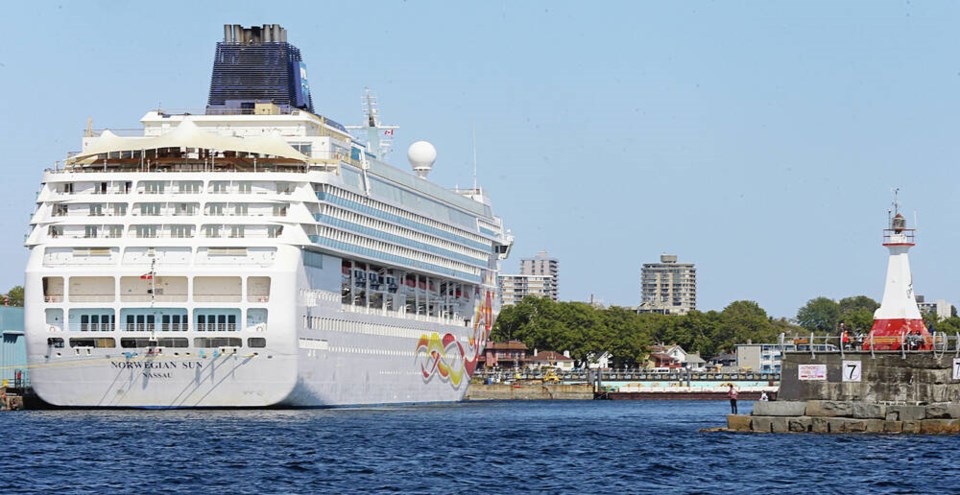Contingency plans are being put together for Ogden Point in case port workers take job action in coming days to back contract demands.
The International Longshore and Warehouse Union sa国际传媒 issued 72-hour strike notice on Wednesday, which would allow members to start job action as soon as Saturday.
Robert Lewis-Manning, chief executive of the Greater Victoria Harbour Authority, which owns Ogden Point, said: “The important thing is the parties are still at the bargaining table. If they weren’t at the table talking I would be more apprehensive.”
Back up plans are being developed in case of a strike, he said, but did not elaborate.
If job action takes place the ships would not be able to come into port, said Lewis-Manning, who added: “But there may be other ways of serving the requirements, which are the contingencies that we are working on in the background.”
As much as possible, the authority is optimistic, he said. “We know both parties want to find a solution.”
Victoria is in the midst of its annual cruise ship season, which sees huge ships stopping in on their way to or from Alaska.
This sector has been estimated by previous studies to be worth more than $130 million to the local economy.
Tourists visit the city’s downtown to shop and go to restaurants and they pack buses to visit attractions throughout the region.
Every time a ship pulls in local tourism operators are waiting for customers at Odgen Point, ready to show them the sights, whether by horse-drawn carriage or historic vehicles or pedal bikes with seating.
Local businesses perform a number of services, such as providing provisions, collecting waste and carrying out ship repairs.
About 330 ship visits were originally scheduled to stop at Odgen Point this season. Vessels were estimated to be carrying 850,000 passengers and crew.
For some, the stop over in Victoria gives them a quick taste of a city they will return to, bringing more tourism dollars.
Federal ministers and Premier David Eby urged the province’s port workers and employers to find a way to avert job action.
The strike notice affects about 7,400 terminal cargo loaders and 49 of the province’s waterfront employers at more than 30 sa国际传媒 ports, including sa国际传媒’s busiest, Vancouver, and at Ogden Point.
About 120 longshoremen are based on Vancouver Island, supported by another 100 or so casual workers.
Their jobs include handling timber and lumber, loading and unloading containers, and working with general cargo. They also tie up cruise ships at Ogden Point.
In a joint statement, federal Labour Minister Seamus O’Regan and Transport Minister Omar Alghabra said they support the collective bargaining process and urged both sides to hash out a deal at the bargaining table.
“Everyone — the employer, the union, the mediators, and the government — understands the urgency and what is at stake for Canadians and our supply chains,” the statement said.
“The parties are responsible for moving goods both nationally and internationally, and industries and consumers would feel the effects of a work stoppage.”
Eby said he’s “profoundly worried about the potential impact of a strike at our ports.”
He said British Columbians have seen rising costs due to inflation and supply chain issues throughout the pandemic, and a strike, potentially increasing costs, is something residents cannot afford.
Negotiations between the union and the sa国际传媒 Maritime Employers Association started in February in an attempt to reach an agreement before their contract expired at the end of March.
Both sides had been in a cooling-off period, but that ended on June 21 and union members voted 99.24 per cent in favour of strike action this month.
The union said contracting out, port automation and cost of living are key issues in the dispute.
“Longshore workers kept this province and the country running during the pandemic, and when Canadians were told to shelter in place, our people went to work,” it said.
“We worked in difficult and hazardous conditions to ensure that the communities where we live, and all Canadians, had the necessary supplies and personal protective equipment to defend against the COVID 19 virus.”
The union said management continues to demand concessions.
The Maritime Employers Association said it has “advanced multiple proposals and positions in good faith, with the objective of making progress and achieving a fair deal at the table.
“Despite today’s regrettable development, we remain ready to re-engage with our labour partners through the federal mediation process, with the desire of reaching a fair and balanced deal at the table that keeps our ports stable and goods flowing for Canadians,” the association said.
“We continue to be open to any solution that brings both parties to a balanced agreement.”
Philip Davies, a transportation economist and principal of Davies Transportation Consulting Inc. in Vancouver, said agreements between maritime employers and port workers are typically long-term deals that involve “pretty hard bargaining.”
Davies said the union has several options short of full strike action to disrupt port operations in the event negotiations are unsuccessful.
“They can disrupt operations at a single terminal or they could not dispatch enough labour for a single shift,” Davies said. “But then, of course, the response by the employers can be a lockout of the union and the terminals shut down, and so either of those things, any of those things are possible.
“It is, shall we say, a tactical and strategic game.”



